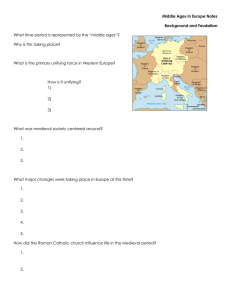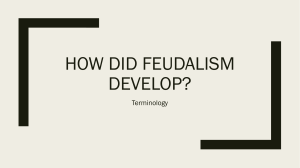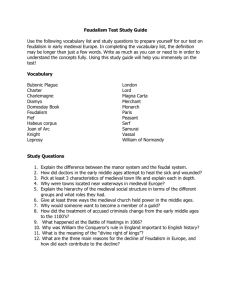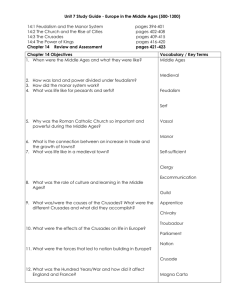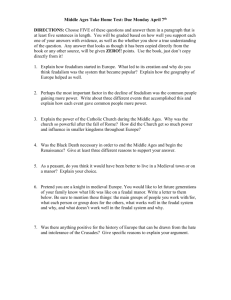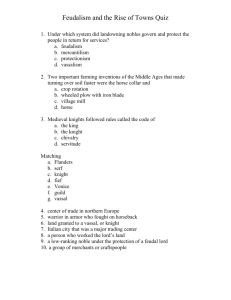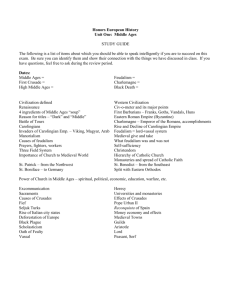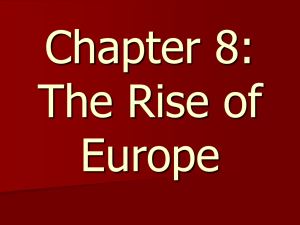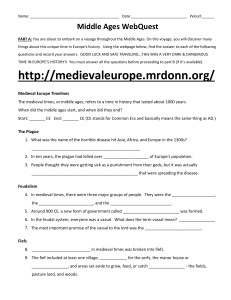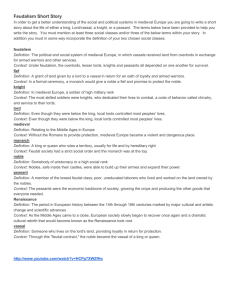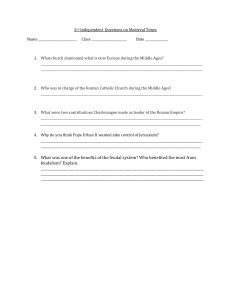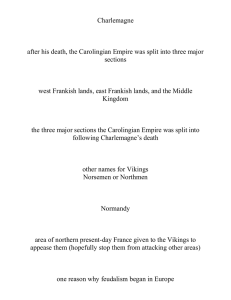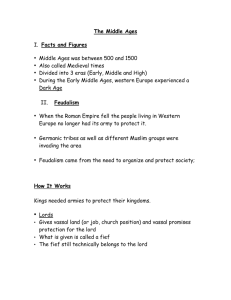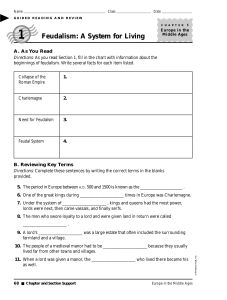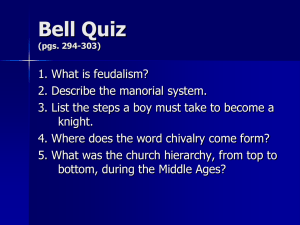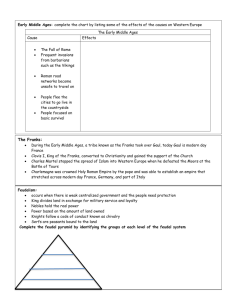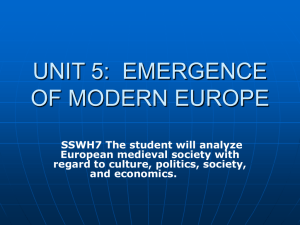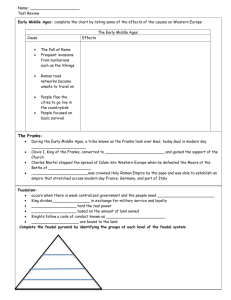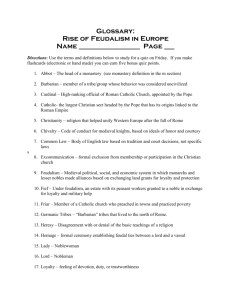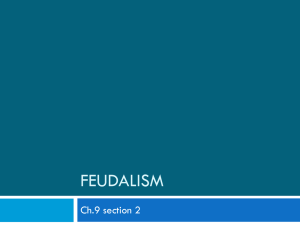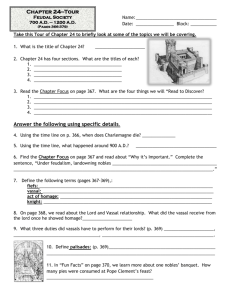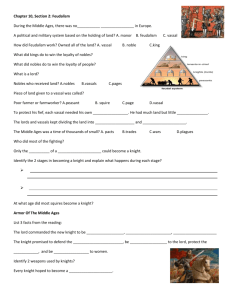Unit 6 Content Vocabulary – Middle Ages ordeal a means of
advertisement
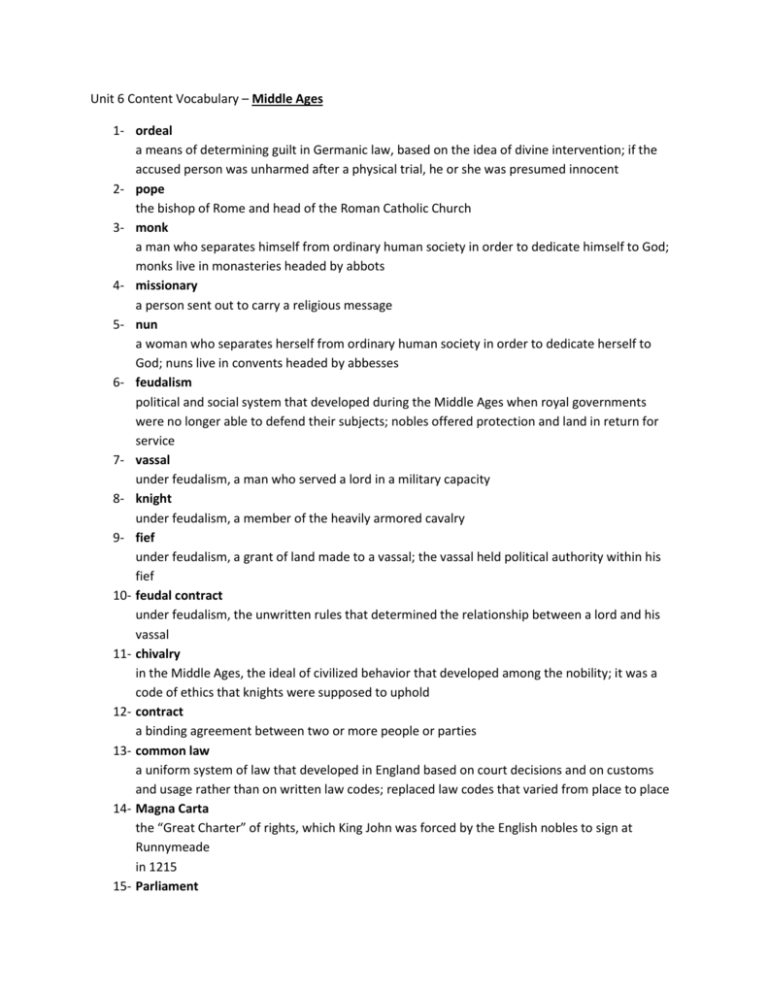
Unit 6 Content Vocabulary – Middle Ages 1- ordeal a means of determining guilt in Germanic law, based on the idea of divine intervention; if the accused person was unharmed after a physical trial, he or she was presumed innocent 2- pope the bishop of Rome and head of the Roman Catholic Church 3- monk a man who separates himself from ordinary human society in order to dedicate himself to God; monks live in monasteries headed by abbots 4- missionary a person sent out to carry a religious message 5- nun a woman who separates herself from ordinary human society in order to dedicate herself to God; nuns live in convents headed by abbesses 6- feudalism political and social system that developed during the Middle Ages when royal governments were no longer able to defend their subjects; nobles offered protection and land in return for service 7- vassal under feudalism, a man who served a lord in a military capacity 8- knight under feudalism, a member of the heavily armored cavalry 9- fief under feudalism, a grant of land made to a vassal; the vassal held political authority within his fief 10- feudal contract under feudalism, the unwritten rules that determined the relationship between a lord and his vassal 11- chivalry in the Middle Ages, the ideal of civilized behavior that developed among the nobility; it was a code of ethics that knights were supposed to uphold 12- contract a binding agreement between two or more people or parties 13- common law a uniform system of law that developed in England based on court decisions and on customs and usage rather than on written law codes; replaced law codes that varied from place to place 14- Magna Carta the “Great Charter” of rights, which King John was forced by the English nobles to sign at Runnymeade in 1215 15- Parliament 16- 1718- 192021- 22232425- 262728- 29303132- in thirteenth-century England, the representative government that emerged; it was composed of two knights from every county, two people from every town, and all of the nobles and bishops throughout England schism the separation between the two great branches of Christianity that occurred when the Roman Pope Leo IX and the Byzantine patriarch Michael Cerularius excommunicated each other in 1054 patriarch the head of the Eastern Orthodox Church, originally appointed by the Byzantine emperor Crusades military expeditions carried out by European Christians in the Middle Ages to regain the Holy Land from the Muslims infidel an unbeliever; a term applied to the Muslims during the Crusades manor in medieval Europe, an agricultural estate that a lord ran and peasants worked serf in medieval Europe, a peasant legally bound to the land who had to provide labor services, pay rents, and be subject to the lord’s control money economy an economic system based on money rather than barter commercial capitalism economic system in which people invest in trade or goods to make profits bourgeoisie the middle class, including merchants, industrialists, and professional people guild a business association that is associated with a particular trade or craft; guilds evolved in the twelfth century and played a leading role in the economic life of medieval cities apprentice one who learns a trade by practical experience under skilled craftspeople technology the science or study of the practical or industrial arts; applied sciences lay investiture the practice by which secular rulers both chose nominees to church offices and gave them the symbols of their office interdict a decree by the pope that forbade priests to give the sacraments of the Church to the people sacrament Christian rites heresy the denial of basic Church doctrines theology the study of religion and God 33- vernacular the language of everyday speech in a particular region 34- anti-Semitism hostility toward or discrimination against Jews
